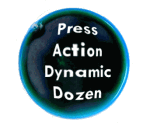Thursday, March 25, 2004
Chomsky, Anarchism and a Military Draft
By Mark Hand
 “My position is, and has always been, that if -IF -there is an army, then it should be a citizen’s army, not a mercenary army of the poor. That means a draft. I think every anarchist (libertarian socialist) would agree.” -Noam Chomsky
“My position is, and has always been, that if -IF -there is an army, then it should be a citizen’s army, not a mercenary army of the poor. That means a draft. I think every anarchist (libertarian socialist) would agree.” -Noam Chomsky
The state is your enemy.
It’s a hackneyed slogan. But it’s one that has served as a useful meditation for anarchists and libertarians during times in our history when state officials have sought to manufacture a particular brand of foreign or domestic “enemy” to justify their murderous conquests.
Does the state have a human face? Monitor the halls of power in Washington -or any capital around the world -and you’ll easily find the overseers and technicians of a system that practices extortion to support its addiction to violence. Whenever there is a need, the overseers also have the means to force us to surrender any claim to sovereignty over our lives for the greater good of the state.
The urge to commit violence is greater in some states than others. Through the end of the 19th century, the United States limited its orgies of sometimes-genocidal violence to the North American continent. Since then, however, the world has been America’s stage for impressive displays of military supremacy.
During this latter period, the government has used military conscription to conduct many of its overseas operations. Anarchists, libertarians, some socialists, and certain religions have opposed conscription and often point to its practice as further proof that a state is antithetical to freedom.
During World War I, anarchist Emma Goldman argued that the military draft is a form of illegitimate coercion. Libertarians contend that conscription is unnecessary because a free nation will have no lack of volunteers to defend its freedom against real aggression. If there is no conscription, the statists will have no army for their power-lust causes, libertarians say.
But what are we to make of the American state’s ability over the last 30 years to conduct foreign conquests using strictly a volunteer army? Why has the U.S. military succeeded in gathering enough bodies on a voluntary basis for operations that serve the interests of only a small segment of the population?
Although the traditional draft ended in 1973, some commentators contend a “poverty draft” has allowed the United States to sustain its policy of radical interventionism. Today’s military, they argue, forces people with the worst economic options into the military.
One of the most notable proponents of the notion of a poverty draft is Noam Chomsky. And Chomsky, a libertarian socialist, takes the argument one step further by supporting a military draft.
I had been out of the loop on Chomsky’s pro-draft stance until a Press Action reader alerted me to his position. The reader commented:
“On Chomsky supporting a draft, this shouldn’t surprise anyone. A draft is morally superior to a poverty draft since at least in principle it does not form a mercenary army of the poor, which is what a ‘volunteer’ army inevitably is under capitalism. Anyway, see Understanding Power: The Indispensable Chomsky, for Chomsky’s views on the draft, pages 35-36 to be precise. He says he never supported an end to the draft.”
Surprised that a philosophical anarchist would support a military draft, I wrote to Chomsky, inquiring about his position on the issue. As highlighted above, here’s his response:
“My position is, and has always been, that if — IF — there is an army, then it should be a citizen’s army, not a mercenary army of the poor. That means a draft. I think every anarchist (libertarian socialist) would agree.”
Chomsky’s support for a military draft is predicated on the existence of an army. By conditioning his position on the issue, Chomsky is suggesting that a more enlightened state may not have a need for a standing army.
If there were to be a military draft, free of loopholes, Chomsky perhaps believes the overseers of the state would be less inclined to maintain an interventionist foreign policy. The combustible combination of universal conscription with never-ending military campaigns could generate a troubling level of dissent and rebellion among all segments of society. The ruling elite would recognize that such angry demonstrations, which would likely be more militant than the anti-draft actions of the Vietnam War era, could threaten their standing in society.
Therefore, a universal military draft, Chomsky might argue, could lead to the adoption of a more benign U.S. foreign policy, which could help the state evolve into a less hostile enemy of the people.
Take note that Noam Chomsky now keeps a weblog called Turning the Tide.
Mark Hand is editor of Press Action.
Share Comments (8)
Comments (8)
 Printer Friendly Format
Printer Friendly Format Login
Login

